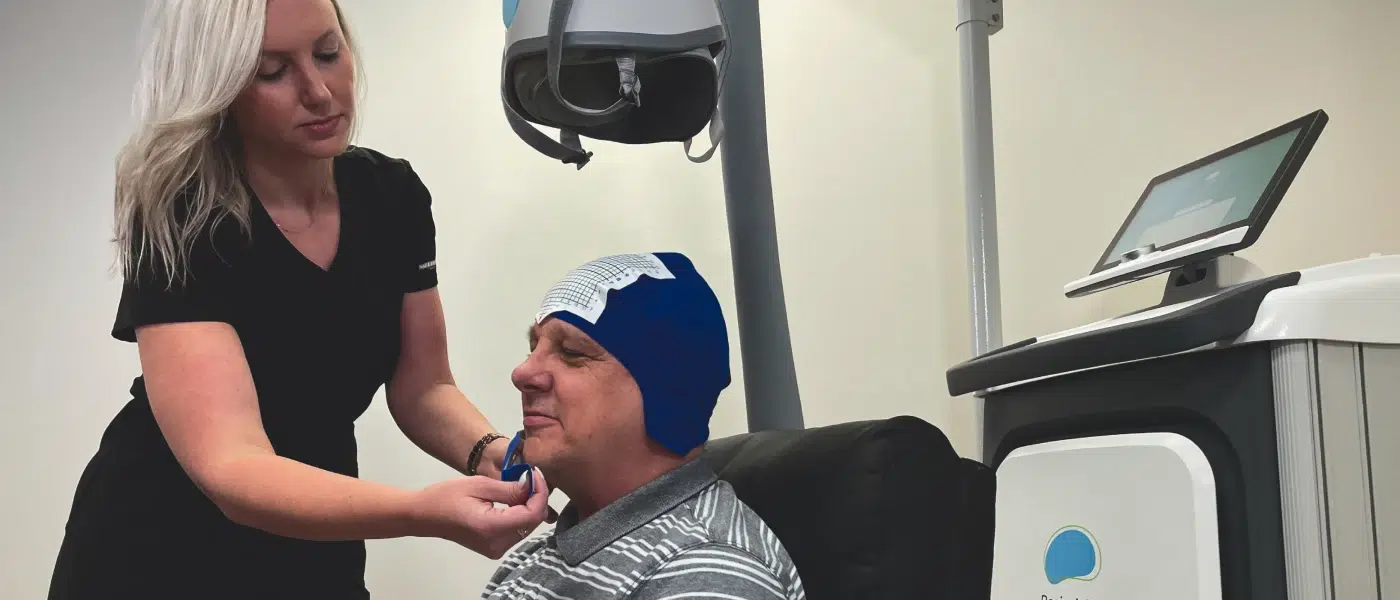
How to Safely Detox From Alcohol
Learn the safe ways to detox from alcohol with The Recovery Team. We offer tips and tricks so you can live a life free from addictions.

TMS therapy is a non-invasive and FDA-approved treatment that uses magnetic fields to stimulate nerve cells in the brain. It has been proven to be an effective treatment for depression, anxiety, and other mental health disorders. Recently, TMS therapy has been gaining attention as a potential treatment option for addiction.
At The Recovery Team, we are committed to offering our patients the latest and most effective treatments available. We believe that TMS therapy has the potential to be a powerful tool in helping individuals recover from addiction and achieve lasting sobriety.
On this page, we will provide you with information about how TMS therapy works, what to expect during treatment, and how it can benefit those struggling with addiction.
TMS therapy is primarily utilized as a treatment for mental health disorders, such as depression, anxiety, and obsessive-compulsive disorder (OCD). It has demonstrated efficacy in reducing symptoms of these disorders and improving mood in many patients.
Apart from its use in treating mental health disorders, TMS therapy has shown potential as a treatment option for other conditions, including:
While TMS therapy is not a cure for these conditions, it can be a valuable treatment option for many individuals. It is a non-invasive and safe procedure that does not require medication, making it an excellent option for those who cannot tolerate or benefit from traditional treatments.
It is crucial to consult a qualified healthcare provider to determine whether TMS therapy is appropriate for you. To find out if TMS is right for you or a loved one and learn more about treatment, contact The Recovery Team at (800) 817-1247.
Hi, I’m Dr. Ignatov. I’m a board certified psychiatrist and addiction medicine physician. Depression is a very common mental health issue in the United States, especially alongside addictive behaviors. In fact, around 21 million of American adults struggle with major depression. Some have treatmentresistant depression, a condition that does not respond or improve with common types of treatments such as psychotherapy or antidepressants. While treating this type of depression can be challenging, there are effective alternatives to help manage symptoms and improve quality of life. Transcranial magnetic stimulation, or TMS therapy, is one of the best options to explore. This proven treatment option is fairly new in the field of mental health care, but it produces positive and long term results with few to no side effects. Here is what you must know about TMS therapy. TMS treatments were approved by US. Food and Drug Administration, or FDA, in 2008 to treat different types of mental illnesses. TMS therapy is an effective treatment option that helps individuals ease their symptoms of treatment resistant depression. When someone does not respond well to medications and therapy, TMS therapy is the next best option to give a try. When used in combination with antidepressants and behavioral therapy, its effectiveness can create even more significant improvement. What is TMS therapy? Transcranial magnetic stimulation, or TMS, is an effective treatment for conditions like major depressive disorder or MDD, treatment resistant depression or TRD obsessive compulsive disorder or OCD, as well as smoking cessation migraine headaches. During a TMS session, your healthcare provider places a magnetic coil against the forehead or scalp of the person, and this coil sends a magnetic pulse that activates neurons in specific areas of the brain. TMS technician administers pulses one after the other in rapid succession, and using this strategy releases neurotransmitters such as dopamine and serotonin, and these neurotransmitters work to ease the symptoms of depression. The magnetic pulses are of the same type and strength as those emitted by an MRI machine, and the person will not feel these pulses and should not feel any pain. TMS therapy is noninvasive, which means that it does not involve any sedation or anesthesia. The patient remains awake and alert throughout the session. Side effects such as tiredness, sexual dysfunction, weight gain, which are often experienced by patients with antidepressants, they do not occur with TMS therapy, and there is no recovery time either. A patient can drive back home after the therapy session and continue with their normal activities. TMS therapy is effective around 50% to 60% of those with depression who have tried and failed to benefit from antidepressant medications experience the clinically meaningful response with TMS, and one third of these people get full remission, which means that their symptoms go away entirely. However, most TMS patients feel better for many months after treatment is stopped, with the average response lasting a little more than a year. TMS therapy is targeted. Magnetic pulses do not directly affect the whole brain. Rather, these pulses reach around two to 3 CM into the brain right under the magnetic treatment coil, and the magnetic field is targeted on the left dorsalateral prefrontal cortex, which is part of the brain responsible for mood control. TMS therapy is fast. Each TMS session lasts around 20 to 30 minutes, and the complete course of treatment will typically last four to six weeks, five days each week. During a TMS treatment session, the patient sits in a comfortable chair while the TMS coil is properly placed on the forehead. And while the pulses are being sent to the brain, patients can listen to music, watch TV and talk to the staff if they want. Or if they’re comfortable, they can have a loved one present in the room during the session. After the treatment sessions, patient will feel just like their normal selves. They will be able to drive back home and continue their daily life. Some people report feeling tired or having a mild headache, although this normally goes away after a week or two. Other people may report improved energy and focus, as well as the ability to deal with anxious thoughts. After treatment. TMS therapy is supportive. It is often used to help other treatments to improve symptoms of depression. While many patients seek TMS therapy because antidepressants are ineffective on their own, combining the two types of treatment can improve the results of each. And your doctor may advise you to continue taking antidepressants after completing TMS treatment to sustain positive results. If you have treatment resistant depression or TRD, these two treatment options can help you find relief. Likewise, many patients who seek treatment for depression undergo some sort of behavioral therapy to address the root cause of their condition. Some people get depression as a result of chemical imbalance in the brain, while others develop depression as a result of trauma or environment. And therapy helps people address these issues and use good coping skills to enhance their mood. And it can also lead to a long term improvement when used with TMS together. Ketamine ketamine is a medication often used to treatment to treat treatment resistant depression or TRD. And TMS treatment and ketamine, whether it’s injectable form or it’s oral lozenges or it’s a nasal spray, can be used together to help those who are suffering from depression. Some people who combine these two treatments enjoy rapid relief from symptoms, which with very few required sessions. It makes the combination of TMS therapy with ketamine the best treatment option for people suffering from mild to severe depression. Combining TMS therapy with other treatments can help you find relief from your symptoms faster, especially if you have TRD, treatment resistant depression. And it can also help you keep your relief for a longer time. If you believe therapy and medication are insufficient, know that TMS could be an option for your depression. TMS is also being researched widely across disorders in the hopes that it will evolve into a new treatment for neurological disorders. Anxiety, chronic pain, PTSD and substance use disorders or addiction. TMS therapy has already been shown to be a safe and effective treatment option for those suffering from mild to severe depression. If you are considering TMS treatment, rest assured that you will get the safe, effective treatment here at the recovery team.
Various types of TMS have been developed by researchers:
Each type of TMS therapy has its own unique benefits and is used to treat different conditions. TMS therapy is a non-invasive and safe treatment option that has been shown to be effective in treating various mental health disorders. It is important to consult with a qualified healthcare provider to determine which type of TMS therapy may be most appropriate for your condition.
TMS (Transcranial Magnetic Stimulation) therapy involves generating a magnetic field that delivers magnetic pulses to specific areas of the brain. The magnetic pulses induce small electrical currents in the targeted area, stimulating nerve cells and causing a variety of effects.
This therapy is used to treat depression by stimulating the left prefrontal cortex, an area of the brain associated with mood regulation, which can improve mood and reduce symptoms of depression.
TMS therapy is a non-invasive, painless procedure that does not require sedation or anesthesia. Each session typically lasts for 30-60 minutes, and patients can resume their daily activities immediately after treatment.
During a TMS (Transcranial Magnetic Stimulation) session, the patient sits in a comfortable chair, and a technician places a magnetic coil on the patient’s scalp. The magnetic coil delivers short pulses of magnetic energy to the targeted area of the brain. The patient may hear a clicking sound and feel a tapping sensation on the scalp during the procedure.
The technician will adjust the intensity of the magnetic pulses until the patient feels a tapping sensation on their scalp. The intensity is typically set at a level that is just below the threshold of discomfort for the patient.
Each TMS session typically lasts around 30-60 minutes, depending on the type of TMS being used and the patient’s individual needs. The number of sessions required will vary based on the patient’s condition and response to treatment.
Although TMS therapy is generally well-tolerated, some patients may experience mild side effects, such as headache or scalp discomfort, during or after the procedure. These side effects are typically temporary and resolve on their own.
The most common side effects of TMS therapy are mild and temporary and include:
Overall, TMS therapy is a safe and effective treatment option for many patients with mental health disorders. Patients should discuss any concerns or questions with their healthcare provider before starting TMS therapy.
TMS therapy is an effective treatment option for individuals with depression who are unresponsive to medication and talk therapy, accounting for around 30% of individuals. TMS therapy works by targeting reduced activity in the prefrontal cortex, which can result in various benefits, including:
TMS therapy is a treatment option that can help many individuals resume their daily activities, such as work and school, free from the effects of depression, anxiety, PTSD, and OCD. In addition, for some individuals, TMS therapy can decrease symptoms of unhappiness and misery in conjunction with other treatment methods.
TMS therapy is considered safe for the majority of individuals as everyone has a unique response to magnetic stimulation. The procedure is non-invasive and only mildly uncomfortable during a short treatment period.
As an FDA-approved therapy, most major insurance companies provide coverage for TMS therapy sessions. At The Recovery Team, we offer TMS therapy and may accept your insurance. Please speak with our counselors to confirm your benefits.

Learn the safe ways to detox from alcohol with The Recovery Team. We offer tips and tricks so you can live a life free from addictions.

Can grief cause alcoholism? The Recovery Team explains the connection between grief and alcohol addiction.

The Recovery Team explains the effects of alcohol on pregnancy and the importance of recovery before pregnancy.